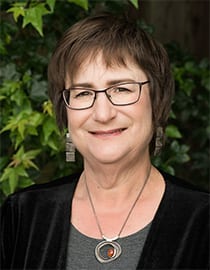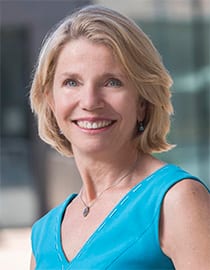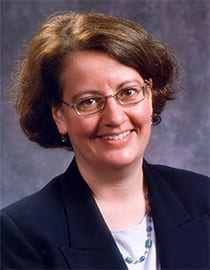
By Gwyneth K. Shaw
Employment and labor law has long had a strong presence at Berkeley Law, with prominent faculty who specialize in the field, deep connections with local and national advocacy organizations, and a student-led journal and clinical group. Nearly 10% of alumni practice in the area.
Now, the school has a hub pulling all those strands together: The Center for Law and Work, or CLAW, led by Professors Catherine Albiston ’93, Lauren Edelman ’86, and Catherine Fisk ’86.
The new leaders say the timing — as the COVID-19 pandemic continues to crush workers, especially at the lower-wage end of the spectrum — couldn’t be better.

“I think it’s been important for a long time to study organizations and work with an emphasis on the problems of workers, as opposed to the issues of organizational efficiency and profit,” Edelman says. “But I think it’s particularly important in the post-COVID world, when so many people are out of work or underemployed in jobs that pay far less than what they earned before the pandemic. Hopefully we can address some of these issues both from a theoretical and a policy perspective.
“I think this is an area of law that is desperately in need of attention.”
CLAW is an institutional hub for cross-disciplinary scholarship — from faculty as well as graduate students in Berkeley Law’s Jurisprudence and Social Policy (JSP) program — and a home base for professional development among students and alumni. The center will also strengthen ties with organizations around the law school and the Berkeley campus, including the student-run Berkeley Journal of Employment and Labor Law (BJELL) and the Institute for Research on Labor and Employment.
The center’s first event, a day-long roundtable on how to reform policing through changing labor relations, is scheduled for January 29.
“There are a very significant number of students who come to Berkeley Law because they’re interested in workers’ rights,” Fisk says. “The law of work is something where we have some tremendous strengths, but students have sometimes had a hard time finding the pathway to the faculty who teach in the area, to the incredible resources elsewhere on campus, which includes some of the best empirical and policy-oriented research in the state and nationwide.
“Berkeley is poised to be a thought leader on the law and policy solutions to these problems, but we need an organized way to harness the scholarly resources that are already here — and the faculty and graduate students and J.D. students who are here, to connect to the huge alumni network in this area, and to incubate ideas.”
Scholarship across the spectrum
CLAW’s three faculty leaders are widely recognized as influential within the broader field of employment and labor law, and each inhabits a different sphere within the discipline.
Edelman’s scholarship examines how organizations are influenced by their legal environments, particularly through the lens of civil rights laws. Her 2016 award-winning book Working Law: Courts, Corporations, and Symbolic Civil Rights, is considered a leading work on the topic. Edelman is also a professor of sociology at UC Berkeley.

Fisk’s focus is labor law, including unions, workers’ rights movements and the First Amendment, and the impact of the shift toward independent contracting in the last decade. Her most recent book, Writing for Hire: Unions, Hollywood, and Madison Avenue, examined the experiences of unionized screenwriters in Hollywood.
Albiston’s expertise revolves around gender, discrimination, and family and medical leave laws, looking at how that leave enables workers — especially women and single parents — to meet the dual responsibilities of work and family when serious illnesses or injuries happen. Also a professor of sociology at Berkeley, she authored Institutional Inequality and the Mobilization of the Family and Medical Leave Act: Rights on Leave in 2010.
“We each have different expertise that we are bringing to the new center, and that speaks to the range of knowledge that we have here at Berkeley Law,” Albiston says. “All of the critical issues regarding labor and employment have emerged in this moment because of the pandemic. We are moving into a key time for policy changes regarding work, and we want Berkeley Law to be part of that important conversation.
“We want our students and our faculty and our campus to be at the forefront of drafting these new policies, at the vanguard of understanding the intricacies of the new labor market. And we especially want to be sure we’re taking into account the needs of all workers.”
California has been a crucible for changes to employment law, enacting a number of progressive policies in recent years. That makes Berkeley Law the perfect spot for CLAW, Albiston says.
“We have a tremendous community and set of resources,” she says. “What we want to do is build on that to create an intellectual hub for all these contributors to come together and incubate new ideas and scholarship about what we’re going to do with the mess we’re in.”

Rey Fuentes ’19, a former co-editor-in-chief of BJELL and leader in the student-run Workers’ Rights Clinic, sees CLAW as a way to let students, practitioners, and academics access all the work that’s been happening in the field at Berkeley Law. He says the school has always been fertile ground for those who are interested in advocating for workers, and that this new center will offer students and scholars even more.
“Having permanent faculty representation to help guide, shape, and synthesize all of this information will go a long way toward institutionalizing employment and labor law advocacy and give students a complete view of what their path would look like if they go in this direction,” Fuentes says. “This opens up so many new opportunities as well as cementing the kind of progress that led to CLAW’s creation.”
Ensuring representation
Elizabeth Kristen ’01, a senior staff attorney at Legal Aid at Work, a San Francisco nonprofit with deep ties to Berkeley Law, says she’s thrilled about CLAW. Her organization works with a group of law students every semester through the Workers’ Rights Clinic, and she herself found her career path through the clinic.
The field of employment labor law is incredibly dynamic, Kristen says, with the landscape and legal doctrine in constant flux. What’s often missing, she says, is academic support for some of the latest legal theories, and data informing how to push policy forward.
Kristen recalls many conversations with Albiston about whether California’s paid family leave policies are having the intended benefit for lower-wage workers. That’s exactly why CLAW will be so helpful, she says.
“What we’re also missing a lot, both in the practice of law and academia, is attention to low-wage workers. We really need partners in this space,” Kristen says. “I think it couldn’t come at a more important time. People are out there saying thank you to essential workers, but what they’re not doing is recognizing that a significant portion of the essential workforce is made up of low-wage workers.
“There are so many people talking about the remote work lifestyle during the pandemic, but a lot of our clients are not sharing that experience.”
Berkeley Law’s strong social science community, built around the JSP program, means CLAW can help practitioners and policymakers think through the questions raised by the everyday experiences of Kristen’s clients, Edelman says.
“We can not only do the kind of really strong legal work that might be found at other law schools, but also social science work that can uncover the kinds of biases inherent in the law and ways in which law perpetuates social inequality,” she says.
With unemployment rates still high and the prospect of a full economic recovery dependent on the development of a COVID vaccine, CLAW is poised to make an immediate impact.
“The pandemic has been a crisis of employment in every possible way. It’s been a crisis of unemployment, obviously, but also a crisis for those who are still working, whether it’s struggling to perform as an essential worker, struggling to work from home and care for children, and beyond,” Fisk says. “We want to bring people together from various parts of the university, as well as the activist and lawyer community, and connect them to the really superb scholars here at the law school.”